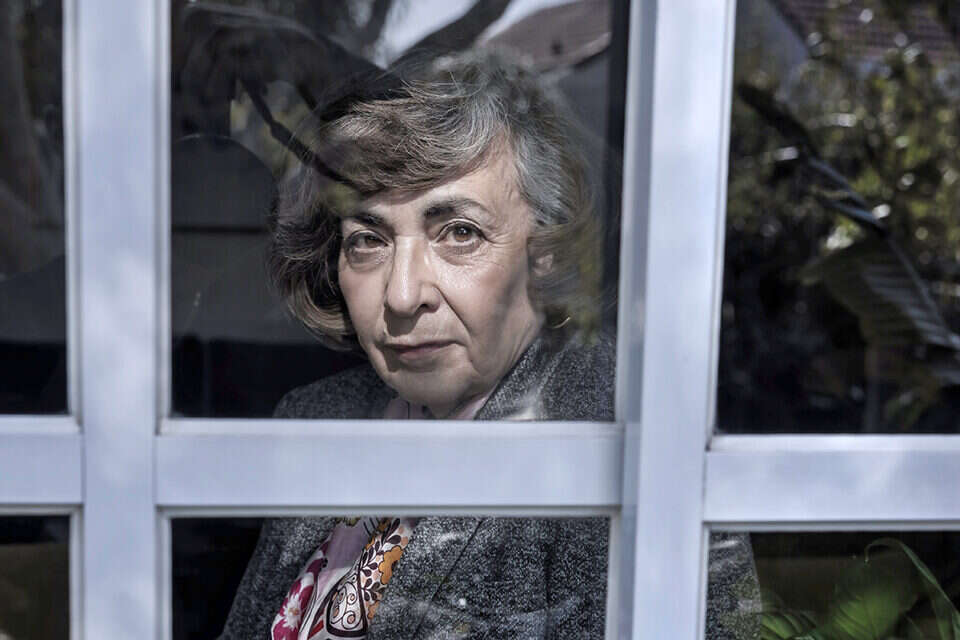"This is the last time I write about the ultra-Orthodox," Naomi Regan declares at the beginning of our conversation, in her lighted home in the heart of the Zichron Yaacov colony.
"I have already said about them everything I had to say."
Her 13th book is currently being published, "After the Canopy" (Kinneret Zmora Dvir), which deals with an ultra-Orthodox couple in their 30s, a widower and a convert, who are harmed by the ultra-Orthodox community in Borough Park, New York, and are looking for another religious community to live in.
As in other of Regan's novels, the protagonists do not abandon God but the obsessions of his believers, and seek a greener grass, inside and out, to live their lives in.
This very enjoyable book, it should be noted, opens a window not only to a society in which Regan focuses on other novels as well, but brings us face to face with the emotional and social experiences of a family trying to rebuild itself after the death of a mother.
The main characters in the book manage to surprise, and so does his power - the mother-in-law who lost her daughter reveals greatness of soul, and does everything to make the widow's matchmaking beautiful;
The widower himself decides that the gray marriage patterns he recognized in chapter one will not be returned in chapter two, and he changes the traditional lifestyle to open a new page;
The repentant bride decides to preserve the originality that characterized her even in the old world, and does not completely erase her secular identity as is customary in Borough Park;
And even the gossipy neighbor has a moment of birth.
The initial entrance into a closed society, which provided literary inspiration.
Borough Park neighborhoods in Brooklyn, Photo: Photo: EP
However, in front of the simple Hasidic people, who are usually revealed in all their glory, there are those who hold power and threaten the integrity of body and mind.
In addition, it seems that in this novel the main news episodes in the real Israel, outside the fictional world, are woven into the plot.
In one of them stands a rabbinical adviser impersonating a psychologist, who is summoned to bring back a seminary girl who is a bit out of the way, but turns out to be a devil in person.
"Chills climbed up a hill. She looked this way and that. Now the two doors were closed, and windows were not at all. That means they are now going through a ban on uniqueness," said Sheindel in her heart and was very frightened. , He dragged his chair around and placed it next to hers, so close that they almost touched each other.
"She hesitated. It was really hard, and she really did not feel comfortable talking about her sex life with a follower who has an office sofa and pictures of women in swimsuits on the wall. Not to mention that he ignores the prohibition of uniqueness. But again - what choice did she have? "
You write about a "rabbinical advisor" who is considered an educational figure and accepted in educational institutions in an ultra-Orthodox community.
It's hard to read and not remember the two stars of recent times: Judah silk silk and Chaim Velder.
"I knew about gold silk for years. When I wrote the play 'Minyan Nashim' (which was shown on Habima between 2001 and 2007 and also conquered the stages in the US, Canada and Argentina; MK), I met a woman who told me that gold silk is known as a negative character. , In Mea Shearim know that anyone who wants blue films and porn booklets can go to his apartment, so for me it was no surprise. I did not know about Velder, but I came across a similar story that took place in the US, a story also mentioned in the novel itself.
In New York there was a psychologist that every ultra-Orthodox school for girls in the area forced the students to go to talk to, and he sexually assaulted them one by one, until one student was brave enough to expose what happened and sue him.
"A New York court has put him in jail for 106 years. Recently, his sentence was reduced to 50 years."
I do not rule by law, but illuminate a spotlight on problems that no one talks about.
Regan, Photo: Yehoshua Yosef
"Are you religious at all?"
When you started writing, your books provided a bold glimpse into the ultra-Orthodox world, into things that seemed almost fictional at the time. Today they are a mirror to current events?
"For many years I thought it was an exceptional case, one in a million, that it was not a pattern and that it was not fair to think or say so. I was living in Jerusalem at the time, and was exposed to a case where a woman I used to meet near kindergarten took her daughter to the 24th floor To her death, she committed suicide with the baby in her arms. It caused a turning point inside me. People said she was crazy, and I investigated the case and realized it was not true. She was married to a perverted man, who was portrayed as a Torah boy even though he abused her and her daughter. "She did not win the support of her family. The only solution this woman found was death. At the time I thought that if I told the truth out loud, they would admit it to me. This was the inspiration for my first book, 'Bat Yiftach', which I initially published only in English."
30 years have passed since then. Thank you today?
"For many years I was hated because of the contents of the spray, and they brought out my bad slander. They said about me that I was not religious and that I hated the religious. Just this week I gave the new book to the rabbi of my community in memory, "They asked if I was religious at all. He apologized to me for what he thought then. I came for the benefit of ultra-Orthodox society, not against it. I loved the ultra-Orthodox, I wanted to be a part of them and I knew they were suffering. But there were difficult stages in which parts of this society sought revenge."
Regan refers to the lawsuits filed against her alleging plagiarism between 2007 and 2014.
One lawsuit was filed by Susie Rosengarten, who was eventually compensated with NIS 73,000, which she donated to charity according to the agreement signed in court.
"The first lawsuit was from a woman who actually let me read her manuscript 20 years before she sued me. It happens a lot, I get to readers' meetings, and women ask me to read what they write, comment and hold. I do it to help. That woman did not find. Publisher, so she published her work with her own money and then said I copied it.
Literary imagination.
Haim Velder,
"Another lawsuit was filed by two ultra-Orthodox women with the help of the same lawyer. People do not know, but the claim was that I copied information from reference books! Not even a literary plagiarism, regardless of the characters or plot. I was so ashamed and beaten that I could not talk to the press. This whole campaign against me has depressed me so much. At some point I just told myself that they would say what they wanted about me, and I would just keep writing. The prosecutors told my lawyer that I would write a check for a million shekels and close the case.
I told the lawyer: 'Go to the end.' I did not agree to close anything under the table. "
What did they really want?
"Mute me and take revenge on me. It was also explicitly written in the indictment that I was dirtying their world and that they wanted to take the spray off the shelves."
In the public consciousness it was not so burned.
"I was very disappointed that I did not get more support from the literary world here. It was clear to me what was going on there, in the sector that was fighting me, but here people did not show interest because I am not part of the brass. The author Yehudit Rotem, who knows the ultra-Orthodox world well, was the only one who helped me and came to testify. I am religious, I am right-wing, I am a feminist, my mother tongue is not Hebrew, I am not connected. It was easy to fight me. They gave me backing. "
Didn't advertising help you indirectly?
"No. I was very offended by it. I felt that the milieu did not want me to enter its territory, so the ultra-Orthodox world campaigned against me, and the secular mainstream actually joined it. They think literature is just Amos Oz, AB Yehoshua and David Grossman.
Everyone who is a man, secular, leftist.
This is their territory.
And there are secular left-wing women who are also allowed to. "
Is there a politicization of literature in Israel?
"There are people in Israel who decide what good literature is. They sit on committees and are appointed by political committees, they are the ones who give the prizes and legislate the laws, who is given honor and who is not. It is in their hands. Maybe it is in the subconscious and they are not aware that they are following writers. From the left-secular milieu, but naturally the tastemakers identify with what the same writers write, because they are in the same mind. And if you are also in the same mind - then he deserves a prize, because he is the same. "Honor. Self-publishing is difficult for me. I like to publish the books and opinions and values, and I am known all over the world. I do not depend on what they say about me in the country. I am constantly in the middle of writing, and that is what is important to me."
Jonathan Zindel, Flash 90, Photo: "I was not surprised".
Judah silk silk
How do you recover from a public-law violation like the one you experienced?
"I wrote a lot of books. I did not give up, these are lawsuits whose purpose was punishment and silence, taking my books out of the stores so that no one would read. So let them think what they want, I wrote my truth about ultra-Orthodox society not only in books but on my website. Today it appears in newspapers. .
"Going back to publishing books after such a crisis of confidence is a cure. I actually show to anyone who thought otherwise," she smiles, "I write novels even without the help of non-fiction books written by ultra-Orthodox women. "Books by young authors and advise them. I would always read and help and give recommendations, but since the trials I listen to the advice of my lawyers, and do not return to this place."
"The rabbinate has the right to change"
Naomi Regan was born in 1949 in Brooklyn, to a Jewish family that did not keep Torah and mitzvos.
She repented independently during her studies in Jewish educational settings, and during her higher education she lived in the Borough Park neighborhood of New York, where she was exposed to the ultra-Orthodox society that stars in the library.
"I rented a room from an ultra-Orthodox family, and I was amazed by lifestyles that are actually contrary to the sublime values of Judaism," she recalls, recounting how she was exploited and humiliated, in part because she was a woman and repented.
She is known for writing about ultra-Orthodox society, but has also written a historical novel about Donna Gracia ("In Your Hand I Will Place My Spirit," Keter, 1999), and the novel "The Alliance" (Keter, 2004), which focuses on a socio-medical dilemma in the background of the Arab-Jewish conflict.
Regan immigrated to Israel in the early 1970s, after marrying Alex in New York ("he was the only man I met who planned to immigrate to Israel like me").
They have four children, the youngest of whom, Akiva, is a writer who has recently published his first book.
In all your books, the heroes eventually leave the community, and some immigrate to Israel. There are private ultra-Orthodox who turn out to be righteous, but the collective is negative. Is this mobilized art?
"This is not propaganda, everyone reads a different part. Someone can say it is against the ultra-Orthodox, and it is legitimate, another can discover the beautiful parts in this society that I show. "Over the years I have received many responses to the fact that following the reading of the spray of appreciation for Judaism is growing, because there are a lot of positive characters in the book.
You've created a subgenre of conservative sex scenes.
"My goal is to look closely at a woman in an intimate relationship, who is also trying to keep the halakhic laws, which is very difficult. I know that when I got married, it was difficult for me not to touch my husband for half a month. It is also forbidden to give him an object by hand or to take anything from him, nothing. It took me years to realize how unfair it is, and that it is not really what is written in the Torah. "And in life itself it destroys relationships between spouses. Like for example when you are going to give birth and your husband can not touch you, it is excessive."
In the book, too, the repentant Leah challenges Halacha, not just ultra-Orthodox society.
"These things need to be eased, and the rabbinate has the right to change what the public can not stand. They could have taken the initiative long ago. Everyone goes to their rabbi, yes? I do not rule, I just put a spotlight on a point no one is talking about. "Some women get used to this life, the fact that there are ultra-Orthodox families with good marital relations with ten children, so it does not seem to bother everyone."
When you list scenes from an ultra-Orthodox bedroom, what do you think the secular reader expects?
"For me, I'm the only reader of myself. I write only what I want to see next, and I do not hide from myself things I have to write, even when it's hard. I do not like these scenes. As a religious woman it's hard for me to write about intimacy, but as a writer it's Was necessary.and the writer wins when there are wars between the normal and routine woman and the religious.I have to get into the character of the writer.
"The secular reader is interested in these details, and so are the ultra-Orthodox. Because they both do not talk about sex and their problems. When 'Val Ishchach Tukach' came out, my first book in Hebrew, I had to prepare ads at the same time but accompanied by my father-in-law. The invitation, and when he heard my name he asked if I was the writer.
"There's a tendency to categorize my books in the voyeurism genre, but if this is where you choose to place the novel, then every writer and every book is considered voyeurism. Every plot takes you to a different world and takes you through the door. Tolstoy also wanted to understand what's going through. "A married woman, and her relationship with her lover. There is no society that is out of bounds and that a writer can not describe her experiences. If people do not like what they see - that they will not blame the writer, but change their face from the scriptures."
"I was miraculously saved"
The upcoming Seder night evokes memories in Naomi Regan.
This year marks the 20th anniversary of the attack on the Park Hotel in Netanya, which claimed the lives of 30 Israelis and from which Regan survived with her family: Upstairs just when the terrorist exploded, and miraculously we were not harmed. "
The successful writer describes the sequence of events that night, the shock and the sounds.
"After the explosion we were taken to another hotel to make a different order, and we sat and read the Haggadah, and I remember feeling that the words 'in every generation stand for our brides' have weight. Every year I have the gratitude that I am alive, that I have another Passover with a full family composition."
What is the next book about?
"A love story that takes place between a descendant of a Nazi hunter and the next generation of a Nazi officer. We need to see both sides."
Were we wrong?
Fixed!
If you found an error in the article, we'll be happy for you to share it with us









